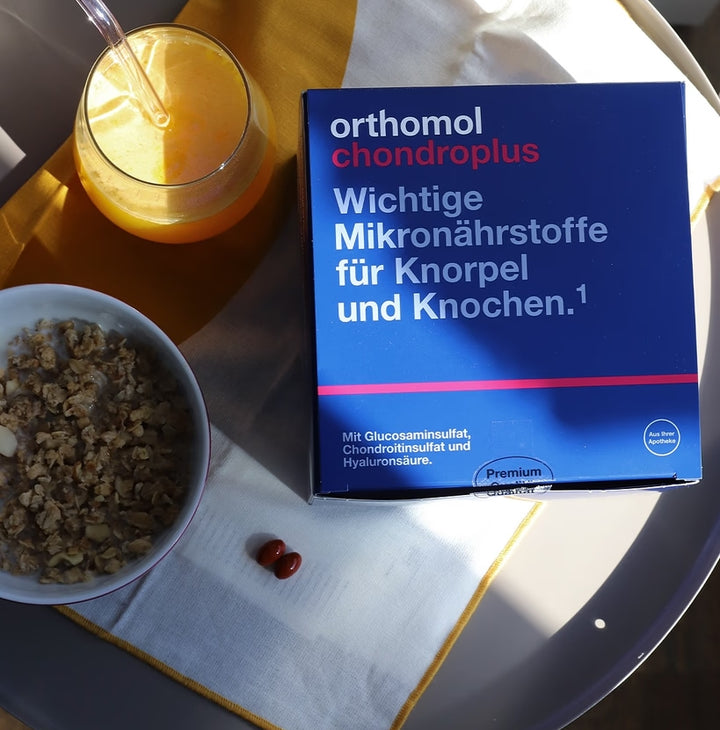
How do Supplements Support Joint Health and Mobility?
Joint health is paramount for maintaining a mobile and active lifestyle. You could be an athlete, fitness enthusiast, or someone who prioritizes their health - Joint flexibility and strength play a key role in enabling movement. However, joint pain and mobility problems are some of the common issues, significantly when we start aging. Factors like diet, lifestyle, diet, wear and tear, and genetics impact joint function. How can we maintain joint health and keep moving with ease? The solution may not be as complex as you think - dietary supplements significantly designed to promote joint health and mobility could be the answer.
From lowering inflammation to offering important nutrients, supplements play a pivotal role in keeping joints healthy and mobile. Read on to understand how joint health is impacted, why it's important to maintain it, and how the right supplements can make all the difference.
Understanding Joint & Mobility Issues
Joints are the connection between bones that enable flexibility and movement. They consist of several elements, including ligaments, cartilage, and synovial fluid, all working in harmony to ensure smooth movement. Cartilage works as a cushion between bones, while synovial fluid lubricates, lowering friction within your joints.
Joints suffer from different issues that impair mobility, manifesting as pain, stiffness, or swelling. The most common types are as follows:
- Osteoarthritis: A degenerative joint disease caused by wear and tear on the cartilage.
- Rheumatoid Arthritis: An autoimmune disorder that leads to inflammation and joint damage.
- Bursitis: Inflammation of the bursae (small sacs of synovial fluid) that cushion the joints.
- Tendonitis: Inflammation of the tendons that connect muscles to bones.
- Joint Injuries: Injuries like sprains, dislocations, and ligament tears can impair joint function.
Factors that add to Joint Problems
Many aspects accelerate the wear and tear of joints, leading to joint discomfort and lower mobility. Listed below are common contributing factors:
- Aging: With age, cartilage naturally deteriorates, and the body produces less synovial fluid, making joints more susceptible to damage.
- Overuse and Injuries: Repetitive movements, high-impact activities, and injuries can all cause joint damage over time.
- Inflammation: Chronic inflammation from autoimmune conditions or other health issues can lead to joint pain and stiffness.
- Weight: Excess weight puts additional pressure on joints, particularly weight-bearing joints like the knees and hips.
- Nutrient Deficiencies: Joints require essential nutrients such as vitamins, minerals, and omega-3 fatty acids to remain healthy.

Significance of Focusing on Joint Health & Mobility
Joints play a crucial role in maintaining mobility, flexibility, and overall physical independence. When joint health is compromised, it can lead to a significant reduction in quality of life, affecting both physical and mental well-being. Chronic joint pain can lead to reduced activity, which in turn can cause muscle weakness, weight gain, and a higher risk of other health problems such as cardiovascular diseases and diabetes.
Moreover, limited mobility often affects mental health, causing feelings of frustration, isolation, and even depression, as individuals may feel restricted in their ability to participate in everyday activities and hobbies.
Focusing on joint health can prevent future problems and enable a more active, pain-free lifestyle. Early intervention through diet, exercise, and the right supplements can promote long-term joint function and reduce the risk of debilitating joint conditions.
How do Supplements Support Joint Health and Mobility?
Supplements are becoming a key part of joint care for people of all ages. The right combination of vitamins, minerals, and other compounds can help promote joint health, reduce inflammation, and support cartilage regeneration. Here's how supplements play a role in maintaining and enhancing joint health:
Reducing Inflammation
Chronic inflammation is one of the primary culprits behind joint pain and stiffness. Over time, inflammation can wear down cartilage, making joints more susceptible to damage and pain. Supplements like omega-3 fatty acids, curcumin (found in turmeric), and antioxidants such as vitamins C and E are known to have anti-inflammatory properties. These compounds can help reduce inflammation in the joints, leading to decreased pain and increased mobility.
- Omega-3 Fatty Acids: Found in fish oil supplements, omega-3s help reduce the production of inflammatory molecules that can exacerbate joint pain.
- Curcumin: The active compound in turmeric, curcumin, has powerful anti-inflammatory effects and has been shown to reduce symptoms of arthritis.
- Vitamin C and E: These antioxidants protect joint tissues from oxidative damage, which can contribute to inflammation and cartilage breakdown.
Supporting Cartilage Health
Cartilage is the smooth, rubbery tissue that covers the ends of bones, allowing them to glide over each other with minimal friction. As we age or experience wear and tear, cartilage can break down, leading to conditions like osteoarthritis. Supplements that support cartilage health are essential for maintaining joint function and preventing further deterioration.
- Glucosamine: A natural compound found in cartilage, glucosamine is often used in supplements to promote cartilage repair and slow its degradation. It is commonly recommended for individuals with osteoarthritis.
- Chondroitin: Often paired with glucosamine, chondroitin helps retain water in cartilage, ensuring it remains cushioned and flexible.
- Collagen: As the most abundant protein in the body, collagen is a key component of cartilage. Collagen supplements can support the repair and regeneration of joint cartilage, improving joint elasticity and strength.
Lubricating Joints
As we age, the production of synovial fluid decreases, leading to stiffer joints and less mobility. Synovial fluid acts as a lubricant between joints, reducing friction and allowing for smooth, painless movement. Certain supplements can help maintain or improve joint lubrication.
- Hyaluronic Acid: A key component of synovial fluid, hyaluronic acid helps keep joints well-lubricated and cushions the impact of daily activities. Hyaluronic acid supplements can be beneficial in promoting joint lubrication and reducing stiffness.
- MSM (Methylsulfonylmethane): MSM is a sulfur-containing compound that supports the production of collagen and helps improve joint flexibility and lubrication.
Strengthening Bones and Ligaments
Joints rely on the surrounding bones and ligaments for stability and function. Weak bones or ligaments can compromise joint health and increase the risk of injuries. Supplements that provide essential nutrients for bone health can also indirectly support joint health by keeping the entire musculoskeletal system strong.
- Calcium and Vitamin D: These nutrients are vital for bone strength. A deficiency in calcium or vitamin D can lead to weakened bones and increase the risk of fractures or joint instability.
- Magnesium: Magnesium plays a role in muscle function and helps maintain the structural integrity of bones and joints.
- Vitamin K2: This vitamin helps direct calcium to the bones, ensuring that it strengthens the skeletal system rather than accumulating in the arteries.
Promoting Overall Mobility
Joint health and mobility go hand-in-hand, and many supplements focus on improving overall flexibility and range of motion. By addressing the underlying issues such as inflammation, cartilage wear, and lubrication, these supplements can enhance the body’s overall mobility.
- Boswellia: An herbal extract with anti-inflammatory properties, Boswellia has been shown to improve flexibility and reduce joint stiffness.
- Vitamin B Complex: B vitamins are important for maintaining muscle and nerve function, both of which contribute to joint mobility. Vitamin B12, in particular, can help reduce joint discomfort by supporting nerve health.
FINAL THOUGHT
Joint health is foundational to maintaining an active, fulfilling life. While age and lifestyle can contribute to joint problems, the right supplements can support joint function, reduce pain, and improve mobility. By incorporating supplements such as glucosamine, chondroitin, omega-3 fatty acids, and collagen into your routine, you can take proactive steps to protect your joints and enjoy a more flexible, pain-free future. Always consult with a healthcare professional before starting any supplement regimen to ensure it fits your individual health needs.




